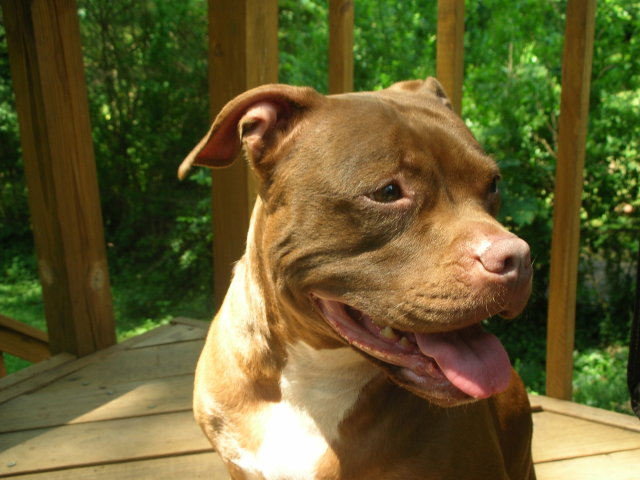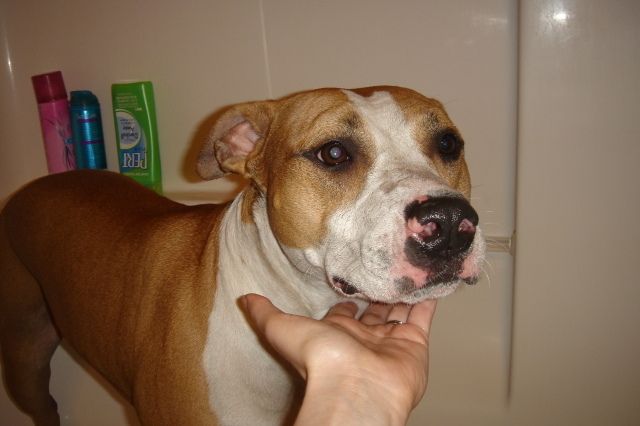QuestionQUESTION: Hi Patti
I have a 4 yr old Boarder Collie and after his first year he developed an extremely allergy to flees. After taking him to a specialist we found out it was a condition called Otopy. He constantly licks his paws and bites his back, we found a very good shampoo that relieves him somewhat but his skin still remains very dry and flaky. The only thing we have found that relieves him completely is the cortisone we give him 5mg (one tablet) in the morning and one in the afternoon. Every time we try and reduce the dosage he starts to scratch again badly. I have two questions for you is there any other medication that will have the same effect and is better for him and more importantly what are the long term effects? He has been on it for almost two years now, we have experienced the usual increased urinating and thirst but it's the internal effects that I cannot see that I am concerned about.
I would very much appreciate it if you could give me some guidance.
Thank you in advance
Kind regards
Mark
ANSWER: using
Hi Mark,
I understand your concerns regarding the use of cortisone.
First, a severe reaction to flea bites is usually referred to as "flea allergy dermatitis", "Atopy" is usually when a dog is allergic to something he inhales, such as pollen, mold, dust, etc. Paw licking is often a sign of a food allergy. Are you sure about the diagnosis?
Are you seeing flea bites, or "flea dirt" on your dog? (Flea dirt is the flea's waste product, it looks like flecks of pepper in your dog's fur and skin. Flea dirt will dissolve into a red color when moistened with a wet Q-tip, this is because it is primarily digested blood)
It usually takes very long term use (as in years) of corticosteroid medication use before side effects that might lead to increased incidence of pancreatitis, kidney damage or generalized immune suppression to occur. If the cortisone is helpful for your dog's problem, and problems arise when you stop using it, it's probably best to go ahead and use it as your vet advises. Rather than completely stopping the cortisone use, have you tried using it every other day? Run this past your vet, before changing the prescribed dosage. You never want to abruptly stop corticosteroid medications. If you are concerned over possible side effects, blood tests can be given every 6 months or so to see if liver or kidney damage is occurring.
Unfortunately, there isn't a substitute for oral steroids, such as cortisone.
If your dog's problem is truly due to Fleas, the problem should go away when it gets cold enough to kill fleas, provided they aren't living in your home. Fleas only spend part of their life cycle on a dog, the rest of the time they live in the cracks of your floors, in the upholstery, and in your dog's bedding. You need to take steps to make sure fleas aren't in your home. You can read more about that here: http://www.ca.uky.edu/entomology/entfacts/ef602.asp
Treatment for flea allergy dermatitis involves preventing the fleas from coming into contact with your dog. You should be sure to provide your dog with a good flea preventative, such as Frontline Plus, K9 Advantix, or Advantage. Your flea preventative should include an insect growth regulator (IGR) as well. IGRs help to kill immature forms of the flea, preventing them from developing into biting adults. You also need to treat your house, especially your dog's sleeping areas, as well as outside areas if your dog has a kennel area.
Some research has shown that the Omega-3 and Omega-6 fatty acid supplements may be beneficial to dogs suffering from Atopy, it can help increase in your dog's inflammatory response. You can read more about using this supplement here:
http://www.preciouspets.org/newsletters/articles/fish-oil-pets.htm
http://www.purinavets.eu/home/research/pdf.htm
As with other nutraceuticals, you would need to give your dog the omega 3/6 supplement daily for at least 6 weeks before you can judge whether or not they're working. Give your dog his prescription meds, but if the omega fatty acid supplement work, you may not need the cortisone as often.
The optimal omega-6:omega-3 fatty acid ratio to maintain a healthy skin and coat in dogs is between 5:1 and 10:1. This means that between 5 and 10 omega-6 fatty acids should be present for every 1 omega-3 fatty acid. Your vet might be able to recommend an omega supplement (the ones made for humans are usually the best quality). Brands of omega fatty acid supplements to look for are: DermCaps, OmegaDerm, EFA-Z, or 3V Capsules. Ask your vet what the dose would be for your dog.
Vitamin E is often recommended along with the omega fatty acid supplement, it helps with the metabolism of fats and also has anti-inflammatory properties. A standard dose is 800 IU of vitamin E daily, but you should run this past your vet, to be sure of your dog would be getting the correct dose. Vitamin E usually comes in soft capsules, you can just break the capsule and mix the liquid Vitamin E into your dog's food.
Have you tried putting your dog on an "elimination diet" to see if it helps the itching? This is when you take the dog off all the foods he's eating and put him on a diet which contains a protein and carb source he's never received before.
Also, be sure you're feeding your dog the very best dog food you can afford. A poor quality diet can contribute to skin problems, and immunity issues. This should be a dog food with a named source of meat as the primary ingredient, no artificial colors or flavors, no "by-products", and is preserved naturally. There are also special diets for dogs with skin problems, such as Wellness Simple Solutions, Avoderm, Nature's Recipe Healthy Skin, and Nature's Recipe Allergy Canine Venison and Rice, to name a few. If you plan on changing your dog's diet, do so gradually over about 5 days, so your dog doesn't develop an upset stomach.
It is a side effect that a dog will need to urinate more often when it's getting cortisone. You just need to take your dog outside more often.
I hope I've been a help.
Best of luck,
Patti
---------- FOLLOW-UP ----------
QUESTION: Hi Patti
Thanks for the informative email. After reading it I think it may be an allergy to pollen or something else like you say. When we took him to a do dermatologist in Cape Town (the only one in South Africa!) I am quite sure he said he has Atopy. We live in a small town which has neighbouring farms that farm wheat and kanola. His paw licking isn't constant but his skin (particularly on his lower back towards his tail) is very dry and flakey. If we ake him off the Prednisone he bites and gnaws there until he has a bald spot. We hav always been careful on what food we fee him we had him on a premium brand for the first couple of years and then about 4 months ago changed to Lifestyle Protector ( http://www.hungryhound.co.za/lifestyle/ ) which I have been told is also very good and has all the trace elements a dog requires. Do you recommend we change his food? We tried the Omega oils for a month or so which made very little difference and was just too costly to carry on with. You mention a protein and carb diet, what would you suggest we try?
Thank you for all you help so far.
Kind regards
Mark
Answer
Hi Mark,
I didn't realize you were not located in the USA, it just makes it harder for me to suggest dog foods.
Being a "premium" dog food doesn't tell me anything about the ingredients of the food you're currently feeding your dog. A dog can be allergic to ingredients in even a good quality food. Common allergens are beef, dairy, wheat, egg, corn, soy, chicken, or lamb. If your dog has a food allergy (or an allergy to something else) the cortisone is just suppressing the itch, not preventing your dog's allergic response. To get control over this situation, you need to remove whatever it is that is causing your dog to itch.
For that reason, if you haven't tried switching your dog to a hypoallergenic diet, it's something you should consider. I can't suggest a brand of food, since I don't know which brands are available in South Africa, but the diet should have a protein source which your dog hasn't ever had, and be grain free. Hypoallergenic dog foods come in combos such as Trout, Duck, Venison or even Kangaroo paired with Sweet Potato, Potato, Peas, Oatmeal or other carbohydrates that aren't a grain. Diets used for food trials must contain basically one protein and one carbohydrate source and neither can be something your dog has had before. You can also get a hypoallergenic dog food from your vet's office. You can read more about trying an elimination hypoallergenic diet on your dog here:
http://www.best-dog-food-guide.com/elimination-diet.html
While on a food trial, don't give your dog edible chew toys (such as rawhides or bones). Treats must be based on the same food sources as the test diet.
Although the food you're feeding your dog contains the omega 3/6 fatty acids I suggested, they probably aren't anywhere near the therapeutic levels which would help relieve your dog's itching. Adding an omega fatty acid as a supplement would also do more to help your dog's dry skin, so that's something you should really consider using. If you can't afford using an omega fatty acid supplement, add some canned Salmon to your dog's regular dog food. To be sure the canned Salmon has the highest omega fats, be sure it's labeled as being "wild caught". Farmed Salmon are fed land-based feed, this lowers their omega-3 levels. Canned Sardines or Mackerel are another fish high in ormega 3's which you could add to your dog's food. Another alternative would be to mix a teaspoon or two of either Flax seed oil, or Salmon oil into your dog's food.
One more thing. You didn't say if your vet did a skin scraping test to rule out Sarcoptic mange. These skin mites are microscopic, so you wouldn't see them on your dog, but they would drive your dog crazy with itching. Sarcoptic mange is often is misdiagnosed as severe atopy. If your dog has Sarcoptic mange, a change of diet won't stop the itching. If your dog's problem isn't a seasonal one, and if he hasn't responded well to cortisone reliving the itch, Sarcoptic mange or a food based allergy need to be considered.
If you haven't spoken to the veterinary dermatologist and given updates of how well (or not so well) your dog is doing lately, that's something you should do. Be sure to ask about testing for Sarcoptic mange and the possibility of trying a food trial.
I hope that helps.
Good luck,
Patti

 Pomeranian digging in beds and clothes
Question
Charlie my Pomeranian
I have a Pomeran
Pomeranian digging in beds and clothes
Question
Charlie my Pomeranian
I have a Pomeran
 8wk old pup biting
Question
pebbles
hi i wonder if u can help me my
8wk old pup biting
Question
pebbles
hi i wonder if u can help me my
 Coping with Incontinence
Question
Abi
Abi, my 8 year old female spayed pit bull,
Coping with Incontinence
Question
Abi
Abi, my 8 year old female spayed pit bull,
 Dog breed?
QuestionQUESTION: Hi Nancy,
I am attaching an image of
Dog breed?
QuestionQUESTION: Hi Nancy,
I am attaching an image of
 Diarrhea in Nursing Bitches
QuestionAtrix & Pup
QUESTION: My Champion Mi
Diarrhea in Nursing Bitches
QuestionAtrix & Pup
QUESTION: My Champion Mi